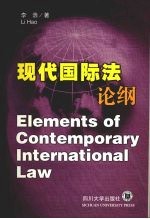图书介绍
现代国际法论纲PDF|Epub|txt|kindle电子书版本网盘下载

- 李浩著 著
- 出版社: 成都:四川大学出版社
- ISBN:7561437636
- 出版时间:2007
- 标注页数:220页
- 文件大小:7MB
- 文件页数:235页
- 主题词:
PDF下载
下载说明
现代国际法论纲PDF格式电子书版下载
下载的文件为RAR压缩包。需要使用解压软件进行解压得到PDF格式图书。建议使用BT下载工具Free Download Manager进行下载,简称FDM(免费,没有广告,支持多平台)。本站资源全部打包为BT种子。所以需要使用专业的BT下载软件进行下载。如BitComet qBittorrent uTorrent等BT下载工具。迅雷目前由于本站不是热门资源。不推荐使用!后期资源热门了。安装了迅雷也可以迅雷进行下载!
(文件页数 要大于 标注页数,上中下等多册电子书除外)
注意:本站所有压缩包均有解压码: 点击下载压缩包解压工具
图书目录
Preface1
Chapter 1 Introduction 1
Section 1 Definition,Origin,Development and Nature of International Law1
1.1 Rules of Law in National and International Community1
1.2 Nomenclature of International Law2
1.3 Definition of International Law3
1.4 Features of International Law3
1.5 Origin and Development of International Law5
1.6 Nature and Binding Force of International Law10
1.7 International Law and Private International Law13
1.8 China and International Law15
Section 2 Sources of International Law17
2.1 Meaning of the Term"Source"17
2.2 Sources of International Law18
2.3 Hierarchy of the Effect of the Sources of International Law23
Section 3 Subjects of International Law24
3.1 Definition of the Subjects of International Law24
3.2 Significance of the Determination of the Subjects of International Law24
3.3 Characters of the Subjects of International Law25
3.4 Scope of the Subjects of International Law26
Section 4 International Law and Municipal Law34
4.1 Significance of the Determination of the Relationship34
4.2 Doctrines and State Practice Concerning the Relationship35
Chapter 2 States under International Law40
Section 1 Definition and Qualifications of States 40
1.1 Definition of States40
1.2 Qualifications of States 41
Section 2 State Recognition and Succession44
2.1 State Recognition 44
2.2 State Succession50
Section 3 Fundamental Rights and Duties of States52
3.1 Introduction52
3.2 Fundamental Rights of States53
3.3 Fundamental Duties of State56
Section 4 State Responsibility57
4.1 Definition and Elements of State Responsibility57
4.2 Remedies for International Wrongful Acts59
4.3 Defenses and Justifications 60
Section 5 Sovereign Immunity 61
5.1 Definition of and Rationale for Sovereign Immunity61
5.2 Origin and Development of the Doctrine of Sovereign Immunity63
5.3 Status quo of the Doctrine of Restrictive Immunity66
5.4 An Appropriate Approach to the Issue68
5.5 Speculation on the Future of Sovereign Immunity68
Chapter 3 Individuals under International Law70
Section 1 Introduction70
1.1 The Link between International Law and Individuals70
Section 2 Nationality71
2.1 Definition of Nationality and Significance of Nationality71
2.2 Acquisition and Loss of Nationality72
2.3 Conflict of Nationality75
Section 3 Legal Status of Aliens77
3.1 Introduction77
3.2 Definition and Scope of Aliens78
3.3 The General Legal Status of Aliens78
3.4 Entry,Residence and Exit of Aliens79
3.5 Treatments of Aliens81
3.6 Calvo Clause and the Two Rules Affecting the Interests of Alien83
Section 4 Extradition and Asylum87
4.1 Extradition87
4.2 Asylum95
Chapter 4 Territory of States97
Section 1 Introduction97
1.1 Definition and Character of Territory97
1.2 Acquisition of Territory99
1.3 Composition of Territory101
Section 2 International Transit Waterways102
2.1 Introduction102
2.2 The Most Important International Transit Waterways102
Section 3 Polar Regions104
3.1 The Antarctic Region104
3.2 The Arctic Region105
Chapter 5 Jurisdiction of States under International law107
Section 1 Introduction107
1.1 Definition of Jurisdiction107
1.2 Sources of Jurisdiction108
1.3 Classifications of Jurisdiction108
Section 2 Limitations of the exercise of Jurisdiction112
2.1 Introduction112
2.2 Limitations on the Exercise of Jurisdiction112
Section 3 Active and Passive Nationality Principle of Jurisdiction115
3.1 Introduction115
3.2 Active Nationality Principle115
3.3 Passive Nationality Principle116
Section 4 Protective and Universal Principle of Jurisdiction118
4.1 Protective Principle118
4.2 Universal Principle119
Section 5 Consular Jurisdiction121
5.1 Definition and Origins121
5.2 Nature of Consular Jurisdiction122
Chapter 6 Diplomatic and Consular Relations124
Section 1 Diplomatic Relations124
1.1 Introduction124
1.2 Classifications and Ranks of Diplomatic Agents125
1.3 Accreditation and Functions of Diplomatic Agents126
1.4 Diplomatic Privilege128
1.5 Diplomatic Immunities132
1.6 Rationale for Diplomatic Privileges and Immunities133
Section 2 Consular Relations135
2.1 Nature of Consular Relations135
2.2 Classifications of Consular Officers136
2.3 Ranks of Consular Officers136
2.4 Appointment and Admission of Consular Officers137
2.5 Functions of Consular Officers137
2.6 Privileges and Immunities of Consular Officers140
2.7 Termination of Functions of Consular Officers141
Chapter 8 The Law of the Sea143
Section 1 Introduction143
1.1 Importance of the Sea143
1.2 Definition and Codification of the Law of the Sea144
Section 2 Baselines146
2.1 Definition of Baseline146
Section 3 Territorial Sea147
3.1 Definition of Territorial Sea147
3.2 Rules of International Law Governing Territorial Sea147
Section 4 The Contiguous Zone and Exclusive Economic Zone155
4.1 The Contiguous Zone155
4.2 The Exclusive Economic Zone155
Section 5 The High Sea156
5.1 Definition of High Seas156
5.2 Rules of International Law Governing the High Seas157
Chapter 9 The Law of Airspace and Outer Space162
Section 1 Introduction162
Section 2 Airspace163
2.1 Definition and Legal Status of Airspace163
2.2 Rules of the Law Governing Airspace164
Section 3 Outer Space166
3.1 Introduction166
3.2 Definition of Outer Space167
3.3 Treaty Series Composing the Space Law167
3.4 Principles of the Law of Outer Space168
3.5 Outstanding Issues Concerning Outer Space169
Chapter 10 The Law of Treaties172
Section 1 Introduction172
1.1 Definition and Nomenclature of Treaties172
1.2 Municipal Law of Contract and International Law of Treaty172
1.3 Forms of Treaty173
1.4 Elements of Treaty174
1.5 Significance of Treaty176
Section 2 Reservations178
2.1 Introduction178
2.2 Definition of a Reservation179
2.3 Validity of Reservations180
Section 3 Validity of Treaties182
3.1 Grounds that May Operate to Invalidate Treaties182
3.2 Other Factor Affecting the Validity of Treaties184
3.3 Legal Effects of Invalidated Treaties187
Section 4 Treaties and Third Parties188
Section 5 Termination,Suspension of and Withdrawal from Treaties191
5.1 Introduction191
5.2 Termination of Treaties191
5.3 Suspension of Treaties193
5.4 Withdrawal from Treaties194
Chapter 11 Peaceful Settlement of International Disputes195
Section 1 Introduction195
1.1 Nature of International Disputes195
Section 2 Means of International Disputes Settlement196
2.1 Characteristics of the Means of the Settlement of International Disputes196
2.2 Categorization of the Means of the Settlement of International Disputes197
Annex206
后记219